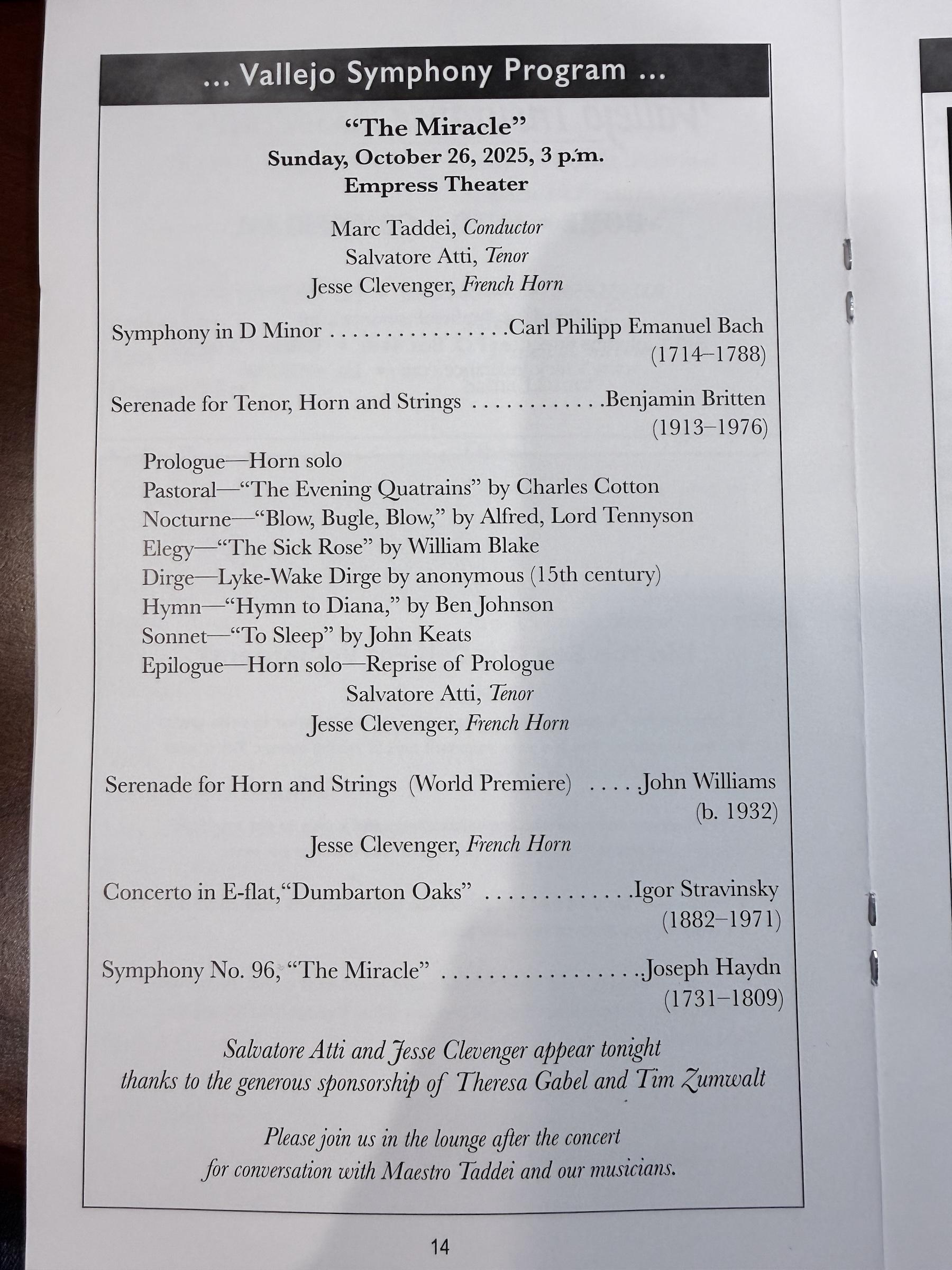‘THE MIRACLE’
October 26, 2025, Empress Theater Vallejo, CA
Vallejo Symphony Orchestra conducted by Marc Taddei
Salvatore Atti, Tenor
Jesse Clevenger, French Horn
CONCERT PROGRAM
- Symphony in D Minor (C.P.E. Bach)
- Serenade for Tenor, Horn and Strings (Benjamin Britten)
Salvatore Atti, Tenor. Jesse Clevenger, French Horn - Serenade for Horn and Strings – World Premiere – (John Williams)
Jesse Clevenger, French Horn - Concerto in E-flat, “Dumbarton Oaks” (Igor Stravinsky)
- Symphony No. 96, “The Miracle” (Joseph Haydn)
PROGRAM NOTES
John Williams (b. 1932). ‘Serenade for Horn and Strings’ (World Premiere). Composed in 2011 but never performed. Scored for solo horn and strings.
Composer John Williams, now in his tenth decade, has garnered more awards and nominations than almost anyone on earth. Only Walt Disney received more Oscar nominations. Having begun his career scoring and playing piano for television show soundtracks, Williams moved on to film, composing scores for dozens of the most popular films of the last sixty years, from Jaws to Star Wars, Raiders of the Lost Ark, three of the Harry Potter films, and many, many more. Williams has also composed classical works, including concertos, orchestral works, and chamber pieces.
We are thrilled tonight to be presenting the world premiere of John Williams’ Serenade for Horn and Strings, composed in 2011 but never performed. Williams composed the Serenade for his close friend, horn player Dale Clevenger (1940-2022), whose wife, Alice Anne Render, also a horn player, died in that year. Clevenger had already played the premiere of a Williams Concerto for Horn and Orchestra commissioned for him in 2003, but this smaller work was a gift, and of a much more personal nature. Dale and Alice Clevenger’s son Jesse, also a horn player, will perform the concerto dedicated to his parents for us tonight. His account of how the Serenade came to be and why it was never played publicly appears here:
John Williams sent this score to my father in 2011 as a memorial to my mother who had passed away earlier that year.
She had battled breast cancer heroically for eight years. She had continued performing with the Chicago Symphony, sitting next to my father, during these years of treatment. Williams came to conduct his music with the CSO annually during Thanksgiving.
He often came to our house for Thanksgiving dinner. As a little kid, I was amazed by this kindly man who had conceived of an entire world of music that I associated with stories (movies) that had accompanied my imagination throughout childhood and on to this very day. I remember hearing French Horn playing in his film scores and deciding “that’s the best thing I’ve ever heard. Mom and Dad do that. I have to do that too!” Mr. Williams was a personal friend of my mother and father and actually composed a horn concerto for my father. There was a lot of love and admiration between them. Williams also, unforgettably, was extremely enthusiastic about my mother’s Derby Pie (a secret family recipe). He would always ask “Will Alice’s delicious pie be included this Thanksgiving?”
Williams recognized the lovely family atmosphere in which I was blessed to grow up. He was aware of my mother’s battle with cancer and often called or wrote to wish her well. When she passed away, he gave my father the deepest form of condolences that we could imagine: this short Serenade. My father lived for ten years after mother’s passing. He never performed the piece. I got the sense that it was too emotionally difficult for him to even approach it. So now, in honor of my parents, and with infinite gratitude to John Williams, I am humbled by the opportunity to perform this work.
-Jesse Clevenger
REVIEWS
EXTERNAL REVIEWS
- San Francisco Classical Voice – Less an elegy than a condolence, Williams’s work begins with chorale-like strings slowly building to a series of prolonged, bittersweet appoggiaturas. Above this tender harmony enters the lyrical horn solo, delivered with balanced grace and sincerity by Clevenger, whose personal connection to the composition was evident throughout the performance. As if his film scores had not already so exquisitely demonstrated this, the subtleties in Serenade evinced yet again the degree to which Williams possesses a particularly intimate knowledge of the horn. Had it been a longer work, the persistent warm and sentimental affect might have become monotonous. Because the pieces lasted less than 10 minutes, and given the circumstances of its composition, these aspects seemed rather to express the state of suspension that grief can often bring about. – Full review
JWFAN REVIEWS
Report by ‘Bayesian’ (original post)
The story behind the Serenade is touching. I won’t spoil it by trying to summarize it. The music itself is lovely. I’m not very good at describing music, but I will say it’s appropriate for the mood it was written for and features some beautiful harmonies and several moments that sound very JW-in-sincere-mode to my ears.
The work runs about 8:35 long and is very chamber-like. I wish I took a better look at the time, as I was focusing entirely on the music, but I estimate there were some 8 violins, 4-5 violas, 3-4 cellos, and 2 double basses, plus Jesse Clevenger on horn.
PHOTOS

